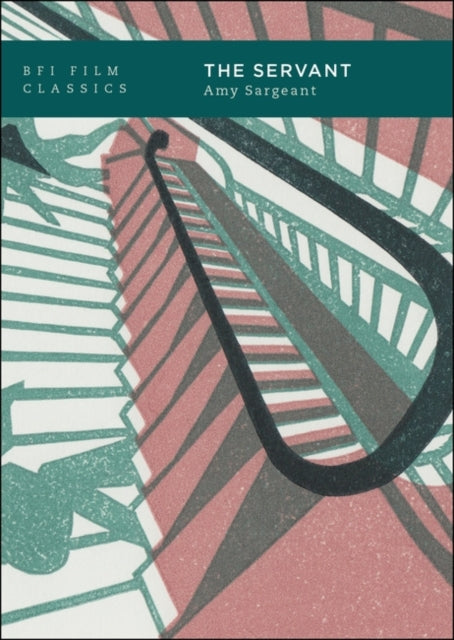Amy (Tisch School of the Arts Sargeant
Servant
Servant
YOU SAVE £1.40
- Condition: Brand new
- UK Delivery times: Usually arrives within 2 - 3 working days
- UK Shipping: Fee starts at £2.39. Subject to product weight & dimension
Bulk ordering. Want 15 or more copies? Get a personalised quote and bigger discounts. Learn more about bulk orders.
Couldn't load pickup availability
- More about Servant
Amy Sargeant's study of Joseph Losey's The Servant (1963) explores the film's context in a long tradition of fictional depictions of the master-servant relationship, highlighting the sinister nature of the relationship between young master Tony and his manservant Barrett. She analyses the performances of Sarah Miles, Wendy Craig, James Fox, and Dirk Bogarde, as well as the film's architectural form, interior design, and decoration. She also considers the film's critical and commercial reception in Britain, Europe, and the United States, as well as its contemporary resonances in TV and cinema.
Format: Paperback / softback
Length: 120 pages
Publication date: 29 October 2020
Publisher: British Film Institute
Amy Sargeant's compelling and meticulous study of Joseph Losey's "The Servant" (1963) sets the film in the context of a long tradition of fictional depictions of the master-servant relationship, from Shakespeare to Cervantes, Henry James, Dorothy L. Sayers, and P.G. Wodehouse. Sargeant points out that while many of these relationships are played for comic effect, that of the young master Tony (James Fox) and his manservant Barrett (Dirk Bogarde) unfolds in a far more sinister manner, with Barrett coming to dominate and humiliate the hapless Tony. Sargeant's reading pays particular attention to the contribution not only of Losey and Harold Pinter, who adapted the screenplay from Robin Maugham's novella, but also of the cinematographer Douglas Slocombe, designer Richard Macdonald, and costume designer Beatrice Bumble Dawson. She analyses the performances of Sarah Miles as Barrett's lover Vera and Wendy Craig as Tony's fiancee Susan, as well as those of Fox and Bogarde, and gives careful consideration to how the film uses architectural form, interior design and decoration, and clothing to establish character and relationships. In the context of the collapse of the British Empire and a beleaguered Establishment beset by spy and sex scandals, the film can be read, Sargeant argues, as a metaphor for the state of the nation in the early 1960s. Finally, Sargeant considers the film's critical and commercial reception in Britain, Europe, and the United States - its release, how it was received as one of a number of emigre films, and Losey's surprising denial of a homoerotic intent in the Tony-Barrett relationship. In her new foreword to this edition, Amy Sargeant considers contemporary resonances of the film's depiction of a twisted master-servant relationship in recent TV and film.
Amy Sargeant's Compelling Study of Joseph Losey's "The Servant" (1963)
Amy Sargeant's compelling and meticulous study of Joseph Losey's "The Servant" (1963) sets the film in the context of a long tradition of fictional depictions of the master-servant relationship, from Shakespeare to Cervantes, Henry James, Dorothy L. Sayers, and P.G. Wodehouse. Sargeant points out that while many of these relationships are played for comic effect, that of the young master Tony (James Fox) and his manservant Barrett (Dirk Bogarde) unfolds in a far more sinister manner, with Barrett coming to dominate and humiliate the hapless Tony. Sargeant's reading pays particular attention to the contribution not only of Losey and Harold Pinter, who adapted the screenplay from Robin Maugham's novella, but also of the cinematographer Douglas Slocombe, designer Richard Macdonald, and costume designer Beatrice Bumble Dawson. She analyses the performances of Sarah Miles as Barrett's lover Vera and Wendy Craig as Tony's fiancee Susan, as well as those of Fox and Bogarde, and gives careful consideration to how the film uses architectural form, interior design and decoration, and clothing to establish character and relationships. In the context of the collapse of the British Empire and a beleaguered Establishment beset by spy and sex scandals, the film can be read, Sargeant argues, as a metaphor for the state of the nation in the early 1960s. Finally, Sargeant considers the film's critical and commercial reception in Britain, Europe, and the United States - its release, how it was received as one of a number of emigre films, and Losey's surprising denial of a homoerotic intent in the Tony-Barrett relationship. In her new foreword to this edition, Amy Sargeant considers contemporary resonances of the film's depiction of a twisted master-servant relationship in recent TV and film.
Weight: 196g
Dimension: 135 x 189 x 9 (mm)
ISBN-13: 9781839021671
Edition number: 2 ed
This item can be found in:
UK and International shipping information
UK and International shipping information
UK Delivery and returns information:
- Delivery within 2 - 3 days when ordering in the UK.
- Shipping fee for UK customers from £2.39. Fully tracked shipping service available.
- Returns policy: Return within 30 days of receipt for full refund.
International deliveries:
Shulph Ink now ships to Australia, Belgium, Canada, France, Germany, Ireland, Italy, India, Luxembourg Saudi Arabia, Singapore, Spain, Netherlands, New Zealand, United Arab Emirates, United States of America.
- Delivery times: within 5 - 10 days for international orders.
- Shipping fee: charges vary for overseas orders. Only tracked services are available for most international orders. Some countries have untracked shipping options.
- Customs charges: If ordering to addresses outside the United Kingdom, you may or may not incur additional customs and duties fees during local delivery.


